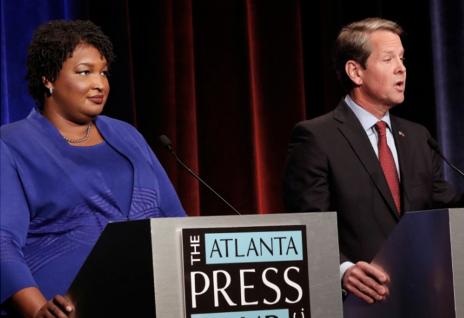On November 15, 2018, the Democratic nominee for the Georgia gubernatorial election was waiting patiently for the election results. It was the biggest breakthrough Georgia had ever had with new registered voters of minorities in the state. Stacey Abrams had run an exceptional campaign that proved an increasingly diverse Georgia had become a Democratic leaning state. She had tripled the turnout rates of Latino and Asian American Pacific Islander voters, and Black voters had reached a peak in voting strength. What was once a predominantly red state, the projection of the 2018 gubernatorial election had demonstrated a historic breakthrough as Georgia was in line to become a blue state. However, the poll results showed otherwise when Stacey Abrams was 54,723 votes short of her Republican opponent, Brian Kemp. The result sparked questions.1 How could Abrams’ votes have fallen this short?
In Georgia, the Republican nominee running for governor, Brian Kemp, had the ultimate responsibility for the conduct of elections. This included the enforcement of qualifying rules, oversight of the finance regulation, and establishment of Election Day procedures that ultimately fell under his rule, as he held the seat for the Secretary of State of Georgia. Furthermore, his office was also responsible for organizing and overseeing all election activities, including voter registration, municipal, state, county, and federal elections.2 This is important as in a state like Georgia, race and politics are intimately entwined with the struggle for power. Brian Kemp used his power as Secretary of State to wage war on voter access by targeting polling locations in low-income neighborhoods and purging the voter rolls specifically of people of color.3

The place where most of the problems in this election begins is with voter registration. State law in Georgia does not require timely processing of applications before an election. Potential voters are required to register twenty-nine days before an election, but the state has no legal obligation to get the name of the voters on the roll for an election.4 With many polling locations being closed in counties of low-income communities, many voters resort to requesting absentee ballots. Absentee ballots are ballots mailed or delivered to voters prior to Election Day. Voters can mail these ballots back, or bring them to election authorities earlier than Election Day.5 These ballot contain all the candidates and issues that will be voted on. Absentee ballots are intended to make it easier to vote; however, with the “exact match” policy Brian Kemp revived in 2017, votes can still be denied by rejecting the ballot itself. Under this policy, a voter application is complete if information on that form exactly matches records kept by Georgia’s Department of Driver Services or the Social Security Administration. If there’s no match, it’s placed on a “pending” status and the applicant is notified by letter from the county board of registrars about the need to provide additional documentation. It’s then up to the applicant to provide sufficient evidence to verify his or her identify.6 This resulted in having 53,000 ballots rejected, proving that the database was not designed for this purpose, which proved the risk of a mismatch is highest for people of color.7
Kemp, in his time in office as Secretary of State from 2012 to 2018, led county and state officials to close more than 200 polling places in marginalized communities. In 2018, the closure of two poling locations occurred two months before Election Day giving little time for voters to prepare. The closure of polling locations in Randolph county, which served majority of black voters, prevented an estimated 54,000 to 85,000 voters from casting their ballots on Election Day; all while all polling locations in white neighborhoods were left untouched.8 In addition to closing precincts, Brian Kemp targeted voters by implementing an “exact match” policy. This policy requires that citizens’ names on their government-issued IDs must precisely match their names as listed on the voter rolls. If they don’t match, additional verification is required by the DMV. If the DMV employees deem the signatures to be mismatched, voters are placed on hold, which leads to ballots being dropped due to small discrepancies. This is crucial to the voting process as the DMV database is not designed to analyze the signatures on voter rolls. This practice causes unnecessary restrictions that do nothing to protect voters but instead creates irreparable harm to the victims of these policies, mostly people of color, low-income Americans, the elderly, and young people.9
Furthermore, during his tenure as Secretary of State, Kemp’s office was responsible for removing more than 560,000 people from the voter rolls for infrequent voting. For an estimated 106,000 of those individuals, their removal from the voter rolls wasn’t caused because they had moved, died, or gone to prison, but rather because they had decided not to vote in prior elections, essentially affecting their eligibility to vote in the 2018 election.10 However, this did not become news until Stacey Abrams began to grow skeptical as anxious voters began to worry that their votes had not been counted. They began calling the Georgian voter hotline, which is worked by the Abrams campaign. As workers began answering the calls, the problem began to grow all too familiar between all of the voters. They had all been told that they had insufficient identification, or that their signature did not match their ID, or that the precinct had run out of real ballots.11 The Abrams campaign had come to understand that too many ballots had been rejected and blocked long before Election Day. Some county election officials simply failed to do their jobs by recording these lost votes. In states like Georgia, securing the right to register to vote does not mean someone has the right to do so. Casting a ballot bears no relationship to whether the vote ever gets counted. This election proved that a severe and distinctive way of voter suppression had taken place in Georgia; Jim Crow laws were no longer a threat, but instead, they had now been replaced by voter purges, closed precincts, and broken voting machines located predominantly in black neighborhoods.12


As light was being shed on the tactics Kemp used to wrongfully terminate voters from the ballots, lawsuits began to be filed. In all the lawsuits that were filed, it became known that Secretary Kemp was responsible for Georgia’s voter list purges from 2010 to 2018.13 Although what has been done by Kemp is not illegal, it has been proven to be unethical. The schemes that now Governor Kemp used to block citizens from being part of the democratic process highlighted the extent politicians will go through to benefit their political agenda. Though in the end, Stacey Abrams had lost the gubernatorial election, her fight was far from over. Shortly after the election, she launched a network called Fair Fight Action, which works hard to uncover the lies and schemes Governor Kemp used to win the election and makes sure this election serves as an example of modern voter suppression. Through doing so, she has been able to remind the public that voting is a constitutional right, not a privilege. Her hard work was just the beginning of a grassroots campaign that had spread like wildfire as new organizations across the nation begin to uncover the gerrymandering that politicians have used in their states. The following years she has spent working in her state to convince political power players in the nation that Georgia was a genuine battleground state, would take effect in the 2020 presidential election. The Georgian gubernatorial election shed light on the reform that the election process needs. Change must not begin at a local or state level but at a federal level. Federal laws must go beyond the limited success of motor vote and require automatic registration and standards must be set for what states can require of voter registration. This will prohibit suppressive requirements that exceed basic standards. Additionally, the federal government must commit to require and fund election security for all elections, in which demands should be shifted to increase resources at locations in low income counties regardless of the county average. Lastly, every corporation should make Election Day a holiday or guarantee paid time off for workers who vote. This will send a signal of civic engagement, which will relieve the pressure from voters of choosing between voting and earning a living. In America, we must recognize that our voting infrastructure needs reform. This election proved that if we as citizens are committed to battle for the soul of America, where we can guarantee a fair chance to shape the discourse of our nation even though victory is not a given, we will have proven the power our democracy has.
- Stacey Abrams, Our Time is Now (New York: Henry Holt and Company, 2020), 56. ↵
- Zoltan Hajnal, Nazita Lajevardi, and Lindsay Nielson, “Voter Identification laws and the Suppression of Minority Votes,” Journal of Politics 79 (2017): 372. ↵
- Fair Fight Action inc. v. Raffensperger, 2019 GA, Lexis Uni (2020). ↵
- Anthony J, Ganghan, “Notice, Due Process, and Voter Registration Purges,” Cleveland State Law Review 485 (2019): 519. ↵
- Thompson v. Kemp, 2018 GA, Lexis Uni (2020). ↵
- Lisa Marshall Manheim, “The Elephant in The Room: Intentional Voter Suppression,” Supreme Court Review 2018, no. 1 (January 2019): 243. ↵
- Stacey Abrams, Our Time is Now (New York: Henry Holt and Company, 2020), 59. ↵
- Stacey Abrams, Our Time is Now (New York: Henry Holt and Company, 2020), 83. ↵
- Muslim Voter Project v. Kemp, 2019 GA, Lexis Uni (2020). ↵
- Stacey Abrams, Our Time is Now (New York: Henry Holt and Company, 2020), 86. ↵
- Thompson v. Kemp, 2018 GA, Lexis Uni (2020). ↵
- Bertall L. Ross II and Spencer M. Douglas, “Passive Voter Suppression: Campaign Mobilization and the effective disfranchisement of the poor,” Northwestern University Law Review 114 (2019): 644. ↵
- Fair Fight Action inc. v. Raffensperger, 2019 GA, Lexis Uni (2020). ↵



5 comments
Matthew Tobar
This was a fantastic read from the get go, and I like the title too! This article sheds some more light on something that not a lot of people are talking about, and the fact of the matter is that it’s not happening in Georgia, but in other states too. Look at here in Texas for example, Abbott is doing everything in his power to make Texas even more of a voter suppression state, same in Florida too, and countless other states across the nation. I had no idea about the infrequent voter purges though, both that it was a thing, and how large scale it was! I actually remember seeing that Brian Kemp was recorded two separate times that he was abusing his position as Secretary of State to suppress the black vote. He knew that the black vote would’ve cost him the election, and he abused his position to win. If you look at the 2017 Special Senate Election in Alabama, Doug Jones flipped that seat blue because of black women, no other way to put it. North Dakota, 2018 Senate Election, Democrat Heidi Heitkamp lost reelection because the Republican State Legislature suppressed the Native American voter bloc, which she relied on to win back in 2012, she ended up losing reelection by 11 points. All in all, this was a fantastic article, thanks for writing it!
Grace Frey
Like Faith, I was shocked while reading this article at the lack of countermeasures that should have put into place to prevent this type of corruption and interference from one of the very people running for election. It is horrible how minorities are still targeted by those in power in an attempt to suppress their voice and right to vote. I am happy that Mrs. Abrams was able to overcome her defeat and reveal the injustices committed by Secretary Kemp; however, those injustices should have never happened in the first place. It is insane to me how a developed country like America still faces problems of corruption that people expect to see in less developed country’s, with less developed government institutions.
Faith Chapman
I am stunned that none of the government officials, state or national, had countermeasures in place to ensure that this kind of thing, where a politician who’s running for some elected state position also has an active role in how the voting registration and voting for the same state position is conducted, does not happen, such as stopping the politician (in this case Brian Kemp) from running in the first place, or at least halting his duties as a person who oversees part of the election process he’s participating in.
Sara Alvirde
What a great story to end with justice! Especially since Mrs. Stacey Abrams was fighting for justice in the first place for minority voters count. Secretary Kemp proved Mrs. Abrams’s point that the voting system had some unfairly hidden holes that no one was looking to fix. I cant believe how much power Mr. Kemp had and abused it to purge the voting system from 2012 to 2018. I am glad that she was so destined to prove that the injustice in the government could be fixed.
Meghann Peace
I really love this article. Stacey Abrams became a hero of mine in the 2020 elections. She showed how someone can suffer an unfair defeat made possible through systemic injustices, decide to fight back against those injustices, and achieve victory over them two years later. Too often the forces in power create and uphold the systems that maintain their power, but Ms. Abrams defeated them. She really is an inspiration to me, and I’m glad that you wrote about her.